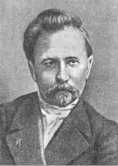Yevgeni Preobrazhensky
| Yevgeni Preobrazhensky | |
|---|---|
 | |
| Born |
Yevgeni Alekseyevich Preobrazhensky 3 February 1886 Bolkhov, Oryol Governorate, Russian Empire |
| Died |
13 July 1937 (aged 48) Moscow, Russian SFSR, Soviet Union |
Cause of death | Execution |
| Nationality | Russian |
| Occupation | Revolutionary |
| Known for |
President of the Presidium of the Ural Regional Committee the Communist Party of the Soviet Union Secretary of the Central Committee, and member of the Politburo Member of the Board of People's Commissariat of Finance (1924–7) President of the Financial Committee and a member of the Council of People's Commissars of the RSFSR Chief of the People's Commissariat of Education Editor of Pravda Author of The ABC of Communism, The New Economics, a polemical essay on the dynamics of an economy in transition to socialism, Anarchism and Communism and The Decline of Capitalism |
| Home town | Oryol |
Political party | Bolshevik, Communist Party |
Board member of | People's Commissariat of Finance (1924-7) |
| Religion | None (Atheist) |
Yevgeni Alekseyevich Preobrazhensky (Russian: Евге́ний Алексе́евич Преображе́нский) (3 February 1886 – 13 July 1937) was an Old Bolshevik, an economist and a member of the Central Committee of the Bolshevik faction and, its successor, the Communist Party of the Soviet Union.
Life
Born in Bolkhov, Oryol Governorate, he was member of the Bolshevik faction of the Russian Social Democratic Labour Party from 1903. In 1904-05, he was member of Ural provincial bureau of the Party; from autumn 1909 in Irkutsk.
Career from the First 1917 Revolution
From March 1917 he was a delegate on the Chita Soviet. In 1917-18 a candidate member of the Central Committee of the Party. From January 1918, a candidate member of the Ural Provincial Committee of the Bolshevik Party. In 1917-18 joined the Left Communists faction opposing peace with Germany in World War I. As President of the Presidium of the Ural Regional Committee from May 1918, the killing of Nicholas II and his family occurred on Preobrazhensky's watch. In 1920-1921 was Secretary of the Central Committee, and member of the Politburo; in 1921 President of the Financial Committee and a member of the Council of People's Commissars of the RSFSR; Chief of the People's Commissariat of Education. Through the 1920s he was a leading Soviet Economist, developing the plan for industrialization of the country and an opponent of the NEP. In 1924 he became one of the editors of the newspaper Pravda in 1924, a supporter of Trotsky as member of the Left Opposition; 1924-27 a member of the Board of People's Commissariat of Finance. After 1927, expelled from the party "for the organization of illegal antiparty printing house." From January 1928, sent to the Urals and worked in the planning agencies. In summer 1929, together with Karl Radek and Ivar Smilga wrote a letter claiming a "ideological and organizational break with Trotskyism."
In January 1930, restored to the party and appointed to the Nizhniy-Novgorod Planning Committee; in 1932 member of the Board of the People's Commissariat of the Light Industry, acting head of the People's Commissariat of State Farms. In January 1933, expelled, arrested and interrogated by the GPU; sentenced to 3 years exile; finally expelled in 1936 and arrested again on 20 December 1936; he refused to confess and on 13 July 1937 he was sentenced to death and shot. He was rehabilitated by the government of Mikhail Gorbachev in 1988.
He co-wrote the book The ABC of Communism with Nikolai Bukharin, with whom he would strongly disagree on the industrialization issue. He also wrote The New Economics, a polemical essay on the dynamics of an economy in transition to socialism, Anarchism and Communism and The Decline of Capitalism.
He argued in the new economics that the USSR had to undertake the "primitive accumulation" that early capitalist societies had had to. That is, the peasants' agricultural surplus had to be appropriated to invest in industry. Thus the Soviet Union had to undertake by planning in "socialist primitive accumulation" what England had undergone by happenstance in the 17th century. This theory was criticized politically and associated with Trotsky and the Left Opposition, but in fact was put into practice by Stalin in the 1930s, as when Joseph Stalin said, in his speech to The Captains of Industry, that the USSR had to accomplish in a decade what England had taken centuries to do in terms of economic development in order to be prepared for an invasion from the West.
References
- Isaac Deutscher "The Prophet Unarmed: Trotsky, 1921-1929" (1959)
- Isaac Deutscher "The Prophet Outcast: Trotsky, 1929-1940 "(1963)
- Edward Hallet Carr "Socialism in one country,1924-1926"(1959)
- Alexander Nove "The Soviet Economic System "(1977, 3rd edn 1986)
External links
|